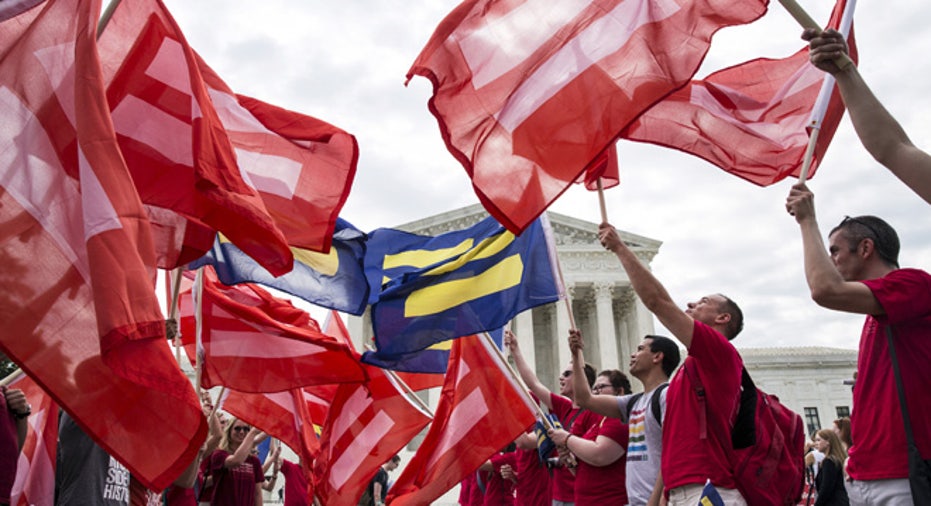SCOTUS Ruling on Gay Marriage Will Help Cut the Federal Deficit

In a landmark decision, the nation's highest court on Friday morning legalized gay marriage in all 50 states -- the question now is will gay couples pay more or drain money out of the federal treasury?
The results from a deep dive into research at the Congressional Research Service, the Government Accountability Office, and the Congressional Budget Office will surprise you.
There are 1,138 federal benefits and protections available on the basis of marital status in federal law.
However, many of those benefits are invalid in the 13 states where gay marriage is illegal: Arkansas, Kentucky, Georgia, Louisiana, Michigan, Mississippi, Missouri, North Dakota, South Dakota, Nebraska, Ohio, Texas and Tennessee.
While the Supreme Court’s decision in U.S. v. Windsor struck down part of the Defense of Marriage Act (DOMA), same-sex married couples still cannot fully access federal benefits in these states. But the Supreme Court could change all that, meaning, gay couples in those 13 states could see changes to a range of federal benefits, including Social Security, Medicare, Medicaid, and health reform.
Back in 2004, the Congressional Budget Office looked into the question of the budget impact of gay marriage at the request of Republican Representative Steve Chabot of Ohio.
The CBO's 2004 study estimated that legalizing gay marriage would bring in less than $1 billion in net revenue to federal coffers over 10 years from income taxes, largely due to the marriage penalty.
Before netting out what gay couples can get from federal benefits programs, the CBO found that tax revenue from federally recognized gay marriage would cut the budget deficit by about $400 million a year from 2005 through 2010, and by $500 million to $700 million a year from 2011 through 2014 (these estimates were made under the Bush tax cuts, which the Obama Administration extended except for married couples earning more than $450,000).
The tax revenues largely come from the "marriage penalty," a weird anomaly in the tax code, where couples who earn a similar income tend to be taxed more than if they were single, because their combined income drives them into a higher bracket and they lose the benefit from things like deductions or the child and dependent care credit, as well as the adoption credit.
However, while recognizing same-sex marriages increases outlays for Social Security and for the Federal Employees Health Benefits (FEHB) program, same-sex marriage would also save the federal government hundreds of millions of dollars annually (the CBO estimated that covering same-sex spouses in the Federal Employee Health Benefits Program would cost about $80 million a year).
Reason: Medicare, Medicaid and Supplemental Social Security means-test benefits, meaning high-earners would be disqualified from getting those benefits.
For instance, Medicare conducts means tests for its Medicare Part B program, a voluntary program that covers physician expenses, as well as for its Part D program, its prescription drug program.
When it comes to gay married couples, the CBO estimated annual savings in 2014 of $100 million in Supplemental Social Security Income (means-tested payments to low-income elderly and disabled), $300 million in Medicaid and $50 million in Medicare.
The Patient Protection and Affordable Care Act, which creates another means-tested entitlement, would also see its costs reduced by same-sex marriage. High-earners would be disqualified from getting tax credits to buy health insurance in the Obamacare exchanges.
But if the Supreme Court rules that all states must recognize gay marriage, retirement security for same-sex couples will improve due to benefits from two Social Security programs. Social Security is a big part of retirement savings, amounting to an estimated 38% of the income for senior Americans.
Gay couples who live in the 13 states that still don't recognize their marriages are denied spousal and death benefits from Social Security that could amount to a big chunk of change, thousands of dollars a year. Social Security pays spousal and survivor benefits to married same-sex couples in states where their marriages are legally recognized.
The spousal benefit assists couples where one spouse makes more than the other, while both are still living. The payment of the lower-earning spouse could be increased to half of the other spouse's payment. That amounts to an extra $780 a month on average, says the Human Rights Campaign.
Specifically, the CBO says a retired or disabled worker—assuming that he or she meets age and other requirements—can get 50% of the worker’s benefit, subject to reductions for early retirement (before age 65 or, eventually, age 67) and, if children are also eligible, subject to a cap on total family benefits.
That means “the basic benefit for a married couple with one earner is 1.5 times that for an unmarried worker with the same work history,” the CBO says.
Also, Social Security provides a survivor benefit, which a gay person can receive if his or her spouse dies. If your deceased spouse's Social Security benefit was bigger, the survivor is entitled to that Social Security check.
Meaning, the widow or widower of a worker—again, if he or she meets age and other requirements—can get 100% of that worker’s higher benefit. And divorced spouses can collect either type of benefit if they were married to an eligible worker for at least 10 years.
Same-sex married couples could also get the one-time payment of $255 for things like burial expenses that the Social Security Administration provides.



















